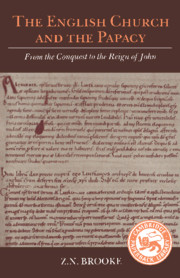Book contents
- Frontmatter
- Contents
- Foreword (1989)
- Preface
- INTRODUCTION
- PART I THE LAW OF THE CHURCH IN ENGLAND
- PART II THE RELATIONS OF ENGLAND WITH THE PAPACY
- Chap. VIII Lanfranc
- Chap. IX William the Conqueror. The traditional outlook
- Chap. X St Anselm. The rise of a papal party
- Chap. XI Henry I. The maintenance of royal control
- Chap. XII Stephen. The “freedom of the Church”
- Chap. XIII Henry II and Thomas Becket
- Chap. XIV Epilogue. From the death of Becket to Magna Carta
- Appendix: English Manuscripts containing collections of Ecclesiastical Law
- List of manuscripts referred to
- Index
Chap. IX - William the Conqueror. The traditional outlook
from PART II - THE RELATIONS OF ENGLAND WITH THE PAPACY
Published online by Cambridge University Press: 01 February 2010
- Frontmatter
- Contents
- Foreword (1989)
- Preface
- INTRODUCTION
- PART I THE LAW OF THE CHURCH IN ENGLAND
- PART II THE RELATIONS OF ENGLAND WITH THE PAPACY
- Chap. VIII Lanfranc
- Chap. IX William the Conqueror. The traditional outlook
- Chap. X St Anselm. The rise of a papal party
- Chap. XI Henry I. The maintenance of royal control
- Chap. XII Stephen. The “freedom of the Church”
- Chap. XIII Henry II and Thomas Becket
- Chap. XIV Epilogue. From the death of Becket to Magna Carta
- Appendix: English Manuscripts containing collections of Ecclesiastical Law
- List of manuscripts referred to
- Index
Summary
I have already suggested that William the Conqueror, as duke of Normandy, was exactly at the old standpoint of Henry II and Henry III, according to which the ruler was the instigator of reform and at the same time the master of the Church in his dominions. It is important to realise the significance of this. It explains both the cordial relations which William so long maintained with the Pope, for they were working for the same end, and also the ultimate disagreement, because they disagreed as to the means by which this end was to be attained. It enables us therefore to appreciate, almost to anticipate, his attitude to the Papacy throughout; and, further, to realise that, without any idea of a national Church, in fact without any idea of departing from the traditional practice of the universal Church, the view of papal authority that was current in Rome, and was penetrating into France and even into parts of Germany, could be disregarded in England and the Pope's orders calmly disobeyed. William I was behaving in the way that enlightened and spiritually-minded rulers had always behaved hitherto. The idea of a centralised Church directly controlled in all its parts by the Pope was novel to him, and therefore untenable; it involved a breach of tradition and custom, quite apart from the menace to his own authority.
- Type
- Chapter
- Information
- Publisher: Cambridge University PressPrint publication year: 1989

